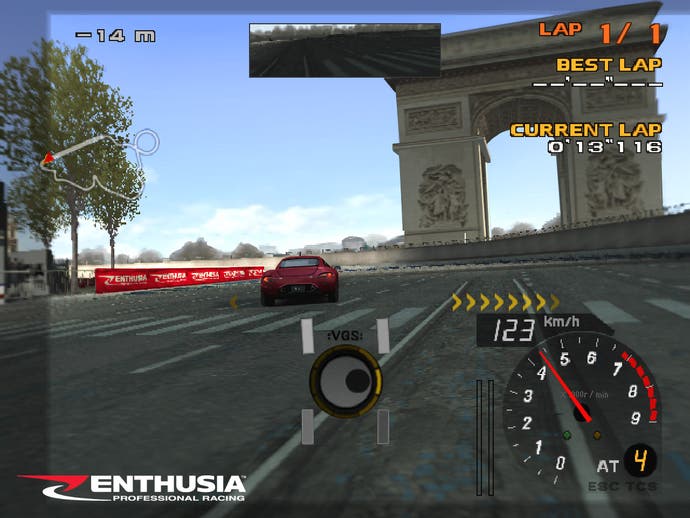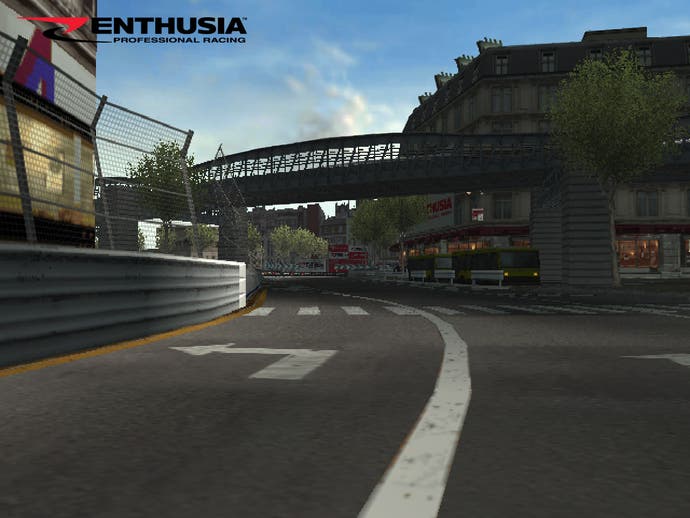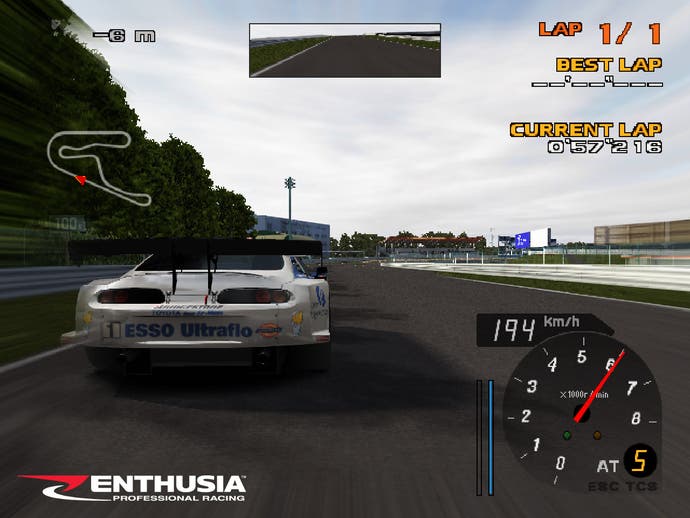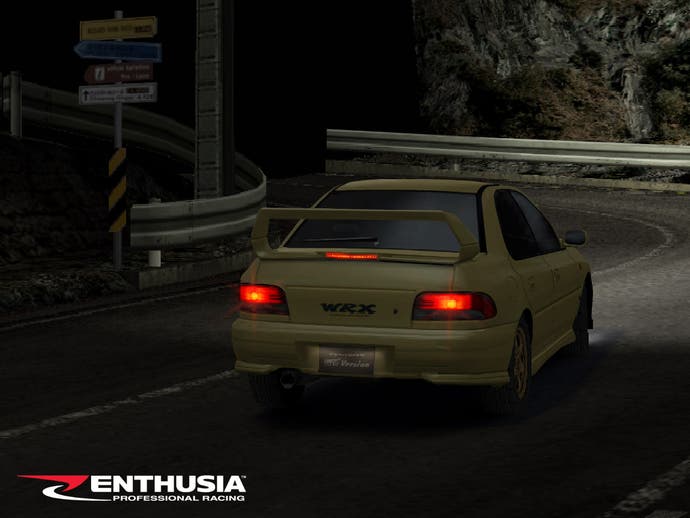Enthusia Professional Racing
Gran's a better driver.
The noble, sporting ethic of "it's not the winning but the taking part" is all very stiff upper lip, but you can take that age old concept a little too far. Extend the logic to Konami's GT wannabe - the bizarrely titled Enthusia - and you've essentially got a racing game where it's not about finishing first but largely about your ability to driving patiently, skilfully and - above all - cleanly.
In the game's main 'Enthusia Life' career mode, the overall goal is to claw your way up the rankings, right the way from 1000 to the very top, but getting there can be a frustratingly long-winded task, demanding no small amount of patience and an innate understanding of what it is the game requires from the player. On a basic level races take place every week, and your overall ranking is calculated by taking the points from your best nine races over a 12 week period. But that's just the start.
In practice, you'll initially drive boldly and aggressively to muscle your way to the front of the pack; rather like you'd probably do in any other racing game ever. After all, to begin with your car will be horribly underpowered, with syrupy steering, rubbish tyres and possibly no traction control or electronic stability assists to help you out when you start to wipe out. But having said that, if you choose wisely enough from the initially available suite of 12 cars winning shouldn't be too much of an issue - but gaining skill points and car points while not losing 'Enthu' points for all your bumps and bruises is the tough bit.
Losing all Enthusiasm

'Enthu' points? Yes. Keep up. Enthusia grants you a few hundred points to begin with, and every time you hit another car, go off course or hit the barriers you lose Enthu points. Lose too many and you'll not gain any skill or car points whatsoever, with only ranking points being granted even if you win. Lose all of your Enthu points (which you will do very easily if you're not uber-careful) and you'll have to effectively sit out the following week's races and potentially scupper your chances of hauling yourself up the rankings. It's a delicate balance to strike; go for the added ranking points of winning a race or take less ranking points but gain skill and car points and level up.
Your patience will almost certainly get the better of you in the early stages and you'll probably just go for the win. But it's a false economy, as all the while you'll be denying yourself the crucial skill and car points you really need to level up the tuning of the car, and in turn your ability to win races with ease.
Rather at odds for a game that makes you work hard for your successes, Enthusia literally gives cars away at the end of every successfully completed race in the form of a raffle. These aren't prizes for success (as they arguably should be), but almost Konami's way of saying "oh shucks, we've got 200 of the blighters to give away and we want you to see them as soon as possible". In no time you'll have built up a veritable fleet covering all manner of real life cars and classes of wildly varying power and controllability.
Fortune favours the brave

Naturally you'll probably gravitate towards a more powerful car in order to stand a better chance of winning a race. But, again, Enthusia's structure and idealism rewards the brave, so just jumping into a powerful monster isn't necessarily your best bet. For a start, many of the more powerful cars you win lack traction and stability control (pretty much essential to begin with), or worse might be rear-wheel drive. For reasons best known to Konami, these cars are hilariously uncontrollable and require levels of patience we simply don't possess to control, let alone master. And if these elements hadn't already dampened your enthusiasm, then the fact that you earn less ranking points for driving more powerful cars makes it that much tougher to climb up the ladder - thanks to a well-intentioned but ultimately irritating odds-based system that awards ranking points based on how strong your car is relative to the field.
It all probably sounds like a bit of a headache, and to be frank until you've spent a good few hours of enduring trial and error it feels like a real chore. But stick with it, level up your car of choice and suddenly things start clicking into place. The first thing you'll notice is that you can actually steer the bloody thing, which in turn will make keeping hold of those precious Enthu points that much easier, with a drifty feel not too dissimilar from that in Ridge Racers - hardly surprising when you consider that the man behind Enthusia, Manabu Akita, plied his trade at Namco for many years working on Ridge Racer games. Very slowly, the fishtailing handling starts to grow on you, and in turn you begin to appreciate that Enthusia occupies that tricky middle ground between simulation and arcade.
Once you find your groove, progressing up the various race classes becomes a whole lot less irritating, your understanding of what you need to do and how you need to approach each race becomes more patient and tolerant, and it becomes one of those games you can cheerily chip your way through, building up a grand collection of cars into the bargain and increasing your feel for the many solidly designed tracks.
Ye cannae change the laws of physics

But we will take this opportunity to write off the well intentioned, but ultimately superfluous introduction of Enthusia's Visual Gravity System (VGS). Designed to give the user the best possible feedback on how your car is responding to the forces upon your car, you get a miniature overhead view of the car, showing the direction of your tyres and the force on them, as well as the car itself. But while it's undoubtedly a clear sign of the attention to physics detail it ends up coming across as little more than a curious gimmick that tells you no more about your driving than what you can see already. Ah well.
And talking of what you can see, it doesn't help Enthusia's cause that Konami didn't go that extra mile to make sure the game kept up with the competition. Although they're quite obviously different games in many ways, it simply isn't in the same league as GT4, lacking even basic widescreen support (and no progressive scan here either, for those of you with the requisite HDTV). There just isn't the same wow factor with some attractive but somewhat sterile environments that are really crying out for someone with artistic passion and technical nous to bring them to life. The cars, meanwhile, are perfectly replicated, but again don't instil the wow factor that the game needs to persuade the masses to do a double take. The lack of any damage modelling hardly helps its cause either, and until someone manages to truly let you wreck cars in games like this, it'll never truly feel as realistic as the designers obviously intend.
There are a couple of neat effects worthy of a mention, though. In particular the blurring effect at the borders of the screen to illustrate the sense of speed (even though the actual sense of speed in the game is pretty poor, truth be told), while the slo-mo effect that kicks in just before a massive high-speed crash does a great job of heightening the tension at that crucial split second before impact, as though your very life is flashing before your eyes.
The sound of broken eardrums

But such moments of inspiration are pretty rare, and in the main Enthusia feels a fairly humdrum affair, not helped at all by possibly the worst soundtrack to feature in a game since the early Pro Evolution Soccer travesties. What is it about Konami and some of its soundtracks? How can it be so brilliant with Metal Gear and Silent Hill, but so awful almost everywhere else? Truly head-shaking fodder that would make lift music seem like the sort of tunes you'd strut your funky stuff to. Possibly the most unintentionally amusing moment of the entire year was when Konami elected to put the soundtrack over the PA during its Dubai press trip for the launch of the game in February. Oh my aching ears.
Anyway, moving on from the horrors of the ears, there are other modes to get your teeth into; there are the obligatory Time Attack and Free Racing modes, not to mention the interesting but ultimately rather superfluous Driving Revolution mode. With 72 driving school-style challenges to work through (somewhat similar in principle to San Andreas' various driving school challenges, if you've played those), there's plenty to keep you going, and they become quite compulsive once you really get your teeth into them. But the likelihood is that they won't keep you occupied for that long, and, once they're done, that's it. You won't be going back. There is a two-player split-screen mode to service your multiplayer needs, but to be honest you can't help feel the game needs a bit more than that to tempt an audience away from the GTs of this world.
And therein lies Enthusia's great problem. It simply doesn't really do anywhere near enough to unseat Polyphony's great monolith of a game. In some ways it's a whole lot more accessible (if you can be bothered to wade through the somewhat daunting layers of formulae that get you up the pecking order), but in others it lets itself down with appalling presentation, rank front end, awful music, and visuals which while perfectly serviceable won't have you gawping in awe if you saw it on a nearby demo pod. Those that do give it a look will probably initially dislike it and warm to it after a few hours, but Enthusia can't afford to be a slow burn when the competition is so fierce. It needed to wow the critics and the punters from the off; it needed to provoke genuine enthusiasm, but it never really gets going enough to warrant that you rush out and buy it. With some interesting and original ideas Enthusia deserves a certain amount of respect, but flounders in that difficult 'good, but clearly not good enough' category.

